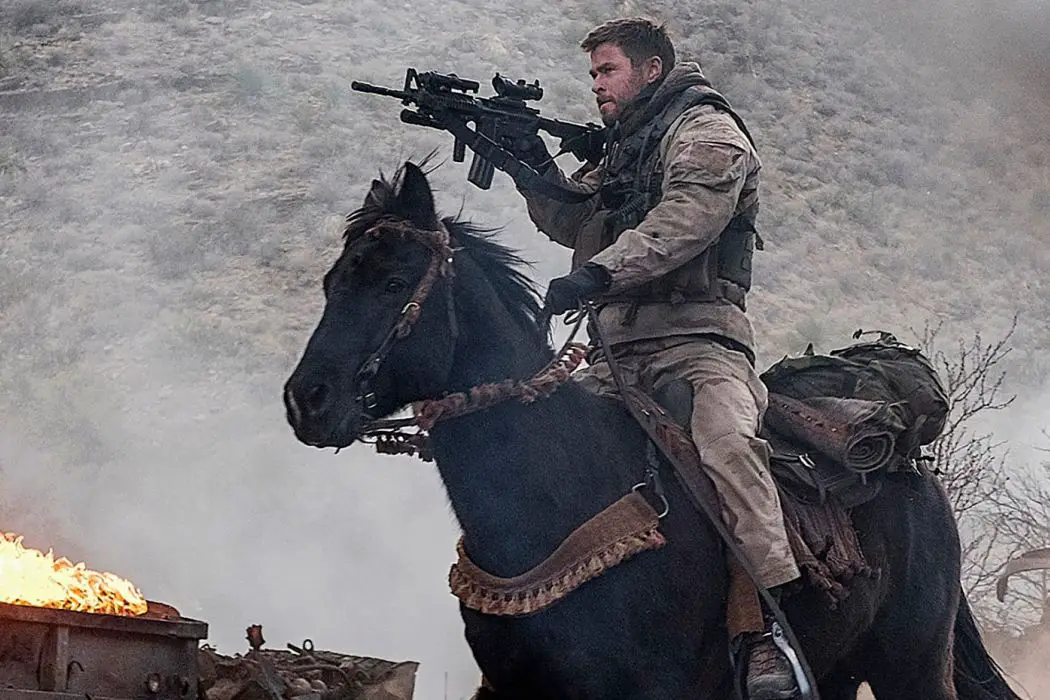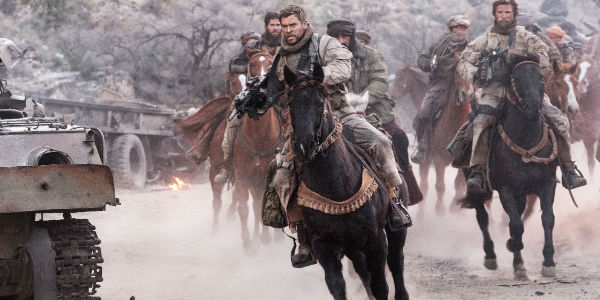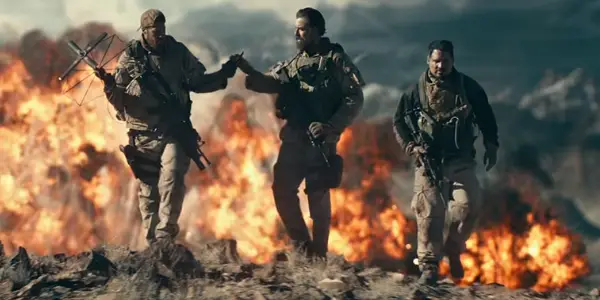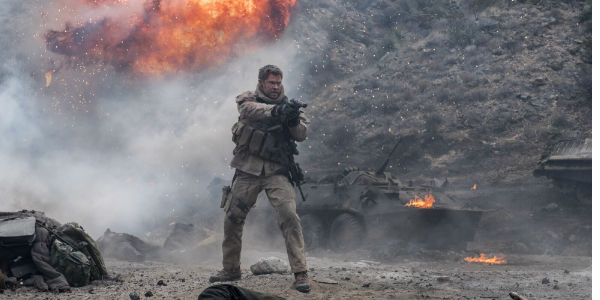12 STRONG: True Story Of Green Berets On Horseback Lacks Horsepower

Jim Dixon retired from practicing law not a moment too…
12 Strong is a painfully well-intentioned but ponderous and plodding tribute to the first American Green Berets in action in Afghanistan after 9/11. Its sense of hindsight, seventeen years after the fact, is also aggravatingly myopic.
The war at home not tied in effectively
Chris Hemsworth plays Captain Mitch Nelson, a young Green Beret, who like director Nicolai Fuglsig, has no actual combat experience. Nelson lobbies to go directly to Afghanistan in the wake of the Twin Towers attacks on September 11, 2001. When he gets there, he and his small detachment of twelve men find themselves side-by-side with Afghan fighters, on horseback, in incredibly difficult terrain where trucks and tanks can’t go.
This should make a terrific movie. But Fuglsig makes just about every rookie mistake in the book as he ineffectually plays traffic cop on this under-budgeted, off-season release, which hasn’t been marketed as much as it’s been summarily dumped in the multiplexes like so much horse manure.

Fuglsig and screenwriters Ted Tally (Silence of the Lambs) and Peter Craig (The Hunger Games: Mockingjay Parts 1 & 2) take what feels like endless screen time to walk us through domestic scenes with the main characters and their families. The movie’s attempts to tie in the war at home don’t work, in stark contrast to Randall Wallace’s We Were Soldiers, in which separate timelines were juxtaposed by intercutting the sequences set in Vietnam with sequences involving the soldiers’ wives which took place as much as a week or two later.
By the time we actually get to the deserts of New Mexico, standing in for the rocky, mountainous terrain of Afghanistan, the audience is almost certainly going to be champing at the bit for action. They will have to wait. Much time is spent listening to military jargon and looking at grease pencil markings on maps, which will be incomprehensible to most audiences, before anything actually gets blown up.
Thor is not the boy next door
Given an inexperienced and wooden, very talky script, the movie is forced to rest on Hemsworth’s extremely broad shoulders. The results are mixed. Hemsworth more or less successfully buries his native Australian accent to play Nelson, although with less success than he did on Ron Howard’s In the Heart of the Sea.
What he really can’t get away with is portraying Nelson as an everyman, just a husband and father who fights the Taliban from horseback. Charlton Heston, who had some experience playing Hollywood heroes, once noted that actors’ careers are to some extent always determined by their physical equipment. Word to the wise: when your leading man is six foot three and made his rep literally playing a blond god, he may be a hard sell as the boy next door.

Despite Hemsworth’s towering stature, he is routinely overshadowed in his scenes with Iranian actor Navid Negahban (Showtime’s Homeland, American Sniper) as an Afghan warlord whose cooperation the Americans need. Understated, enigmatic and quietly compelling, Negahban turns in the one performance audiences are likely to remember.
Although the movie depicts its main character’s first experience with combat, during which he does kill an enemy soldier, little is made of the emotional effect it has on the character. Hemsworth wipes his face with a towel as he gets a word or two of sage advice from a more seasoned warrior. It’s almost as if killing can be wiped away that easily. Other recent war movies, such as Clint Eastwood’s American Sniper and David Ayers’ Fury dealt with the terrible cost of making men good at war with far more compassion, insight and maturity.
Hollywood stalwarts Michael Shannon, Michael Pena, William Fichtner and Rob Riggle provide workmanlike performances but are largely wasted in stock supporting roles. Shannon, one of Hollywood’s fastest-rising screen villains, gets to play a good guy for once. The movie’s primary villain is played by Numan Acar, who spends most of his time scowling in frustration with a facial expression reminiscent of Conrad Veidt that screams for a subtitle reading “Cursed infidels!”
While the movie largely tries to gloss over politics, they are part of its DNA. That makes its lack of hindsight particularly aggravating.In the current climate, interview footage of Vladimir Putin talking about how he warned President Bush that a major terrorist attack might be imminent is gag-worthy. That the war in Afghanistan has been going on for seventeen years (the longest in American history) is stepped over like an inconvenient landmine.
A little late to be making a recruitment movie
This is the sort of movie they made plenty of in the wake of Pearl Harbor, feature length recruitment ads that demonized our enemies into two-dimensional racial caricatures. There’s a big difference between 1942 and 2018, not the least of which is that eighteen years after Pearl Harbor Hollywood no longer felt the need to make movies about why America had to fight the Japanese.
Lacking is the sort of insight and perspective that informed Kathryn Bigelow’s vastly superior Zero Dark Thirty. Bigelow and her go to screenwriter Mark Boal, understood, which the filmmakers of 12 Strong do not, that making a movie about events like this, given the passage of time, imparts to filmmakers an obligation to reflect, re-evaluate and reconsider. Wars are always more complex in hindsight.
What we have here is a movie more on par with the John Wayne movie Sands of Iwo Jima, directed by cinema pioneer Allan Dwan, which was made five years after World War II but felt like a propaganda recruitment vehicle. Worse, it actually invites comparison with Wayne’s reprehensible, shameless Vietnam recruiting film The Green Berets, which he starred in and co-directed with veteran second unit director Ray Kellog and an unbilled Mervyn LeRoy.
Fuglsig has the simplistic political agenda down pat, but isn’t supported by veteran collaborators as Wayne was. The action, which is the movie’s only real selling point, is pedestrian, and frankly poorly edited. Combat may be chaotic but the paying audience deserves to know what’s going on. Fuglsig is sadly addicted to the phony, gasoline based pyrotechnics that have long been a staple of Jerry Bruckheimer produced movies.
Although some of the explosions are huge, they don’t look like real. Before Steven Spielberg shot Saving Private Ryan, which probably remains the gold standard of Hollywood war movies, he watched hours upon hours of World War II combat footage, and as a result his own action footage was traumatizingly realistic. The climactic cavalry charge is good, but not as good as Michael Curtiz’s 1936 The Charge of the Light Brigade (and before we’re inundated with emails, I am not defending Curtiz’s indefensible use of the “running W” trip wires which were used to engineer the horse falls and resulted in the destruction of scores of horses).
Budgetary limitations obvious
12 Strong was reportedly made for around $35 million, which is not a gigantic budget for a large scale Hollywood action movie. The budgetary limitations become evident when the movie’s rookie director doesn’t know how to cover for them. At one point Hemsworth looks down from his vantage point and notes that the Taliban have 15,000 troops below. The point of view shot that follows is of an obviously much smaller number of extras, making Hemsworth’s line embarrassingly reminiscent of Donald Trump’s assessment of his own Inauguration Day crowds.

Sequences depicting B-52 bombing raids conspicuously and jarringly do not show the planes. Yes, B-52s are expensive. But if the Department of Defense won’t loan you any, buy a little stock footage or try radio-controlled models, a technique used effectively by both Roger Corman and Steven Spielberg.
Fuglsig also blows it in a scene which might even have been the climax back in the day. When Hemsworth’s Nelson responds to a critical email from then Secretary of Defense Donald Rumsfeld, Rumsfeld reads the email during a televised news conference. Fuglsig buries this, keeping the TV in the corner and letting supporting actors talk over it. Are you kidding me? You put this sort of up front, center stage. There shouldn’t have been a dry in the house, but most of the sparse audience will forget the scene.
12 Strong: Conclusion
Well-intentioned though 12 Strong may be, it lacks the writing or directing to be great drama, and lacks the perspective or insight to be anything else but an historical-based action movie, and it isn’t all that impressive on that front. It’s two hours and ten minutes of your life you aren’t getting back, though pales in comparison to seventeen years of continuous carnage.
What do you think? Is 12 Strong an inspiring true story of men at war, or just a two-dimensional recruiting film?
12 Strong is in theaters in the United States, and is scheduled to be released on January 26, 2018 in the United Kingdom.
Does content like this matter to you?
Become a Member and support film journalism. Unlock access to all of Film Inquiry`s great articles. Join a community of like-minded readers who are passionate about cinema - get access to our private members Network, give back to independent filmmakers, and more.
Jim Dixon retired from practicing law not a moment too soon, and now works as a freelance writer and film critic. A lifelong and unrepentant movie geek, he firmly believes that everything you need to know in life you can learn at the movies. He lives in upstate New York.













